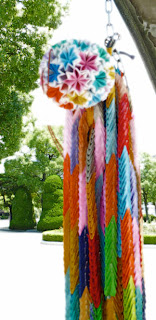 |
| Thousands of wreaths of paper cranes are brought to the Peace Park in Hiroshima to commemorate the victims of the Hiroshima bomb. Photo by Sharkey. |
Prejudice, and anti-Asian sentiments played a part in choosing Japan as the first (and so far only) target of atomic attacks. Unlike with Germany and Italy, whose leaders and their followers were hated, but who were familiar countries to most Americans, the Japanese were very foreign in many ways, and it was easier for the US propaganda machine to demonize them and dehumanize them. WWII era posters, comic books, and cartoons show the Japanese (often called "Japs" as an insult) as dark, short, ugly, and dishonest (Inada, 2000). While posters attacking the European axis countries only focused on the caricatures of Hitler and Mussolini, all of the Japanese race was ridiculed. The US portrayed itself at war with the Nazi (not the Germans), the fascists (not the Italians), but with Japan and all of its people (Wikipedia, 2011). After the Pearl Harbor attack by the Japanese Air Force, the US interned Japanese Americans living in coastal areas into concentration camps. There was very little opposition by white America to the internment of people who mostly were American citizens, and this shows that the propaganda had worked: Japanese Americans were not seen as real Americans (Inada, 2000). This perception worked in favor of the decision to bomb Japan, rather than Germany, a country whose citizens Americans could more easily identify with. So all in all, several reasons and excuses came together with prejudice, and lead to the bombing of Hiroshima and Nagasaki: desire to end the war, fear of the Soviet Union's power in Europe and Asia, and racial fear of the "yellow peril," a late 19th century metaphor used to scare people against Asian immigration to the US (Wikipedia, 2011).
 |
| Manzanar Japanese Internment camp Owens Valley, California. 1942 (Source: Wikimedia Commons--public domain) |
No comments:
Post a Comment